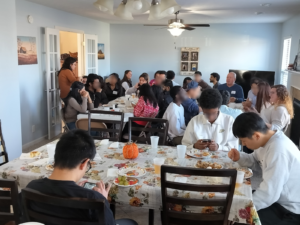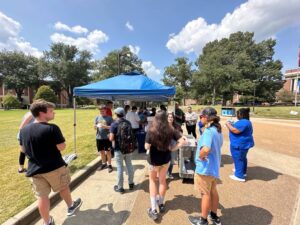“What you’ve heard from me in the presence of many witnesses pass on to faithful men who in turn can train others.”
Paul of Tarsus
“The gospel came to you on its way to someone else.”
Rob Gallaty
“Your church is the fruit of other people and churches whose names may have been long forgotten. Has your church started other churches, or did history stop with you?”
Steve Addison
The gospel is meant to be passed on. It was meant to saturate every pour of our being and every nook and cranny of society. It’s what Jesus preached: “Repent the kingdom of heaven is at hand!” What a picture! In order to see the kingdom come near and the gospel passed on Jesus had a big vision, a focused plan, and an open hand.
EVERY AND ALL: The Big Vision
Jesus had a big vision and started with the end in mind. Here are a few of God’s “vision statements”:
- Go and make disciples of ALL nations… – Matthew 28:19-20
- EVERYONE who calls on the name of the Lord will be saved. Romans 10:13
- This is good and pleases God our Savior, who wants ALL people to be saved and to come to a knowledge of the truth. 1 Timothy 2:3-4
- After this, I looked, and behold, a great multitude that no one could number, from EVERY nation, from ALL tribes and peoples and languages… Revelation 7:9
- …Instead, he is patient with you, not wanting anyone to perish, but EVERYONE to come to repentance. 2 Peter 2:9
What a vision! It seems like Jesus’ vision was for everyone. EVERY nation. ALL people. EVERYONE. Now, did Jesus have people walk away? Absolutely. But only after they had access to him! What’s interesting is that Jesus actually seemed to be okay with it. We don’t see him chasing after the rich young ruler (Mark 10) or the crowds that walked away after he told them to eat his flesh and drink his blood (John 6). We do, however, have him saying things like Matthew 24:14, “And this gospel of the kingdom will be preached in the whole world as a testimony to all nations, and then the end will come.” It seemed like Jesus was content with people choosing to walk away from him only AFTER they heard about him.
If Jesus’ vision is for all and every, then why do we find ourselves being content with some and enough? We impact SOME of the campus. We have ENOUGH students show up to appease our egos and impress our ministry partners or to keep our boss off our backs. We have a great turnout and something inside of us breathes a sigh of relief and thinks we made it. This is not to say we don’t rejoice in what God is doing. People showing up is exciting and helps build momentum, but if we find ourselves more concerned with filling a room with students instead of a campus with the gospel we’ve missed what Jesus had in mind.
If there is at least one lost student, faculty, or staff on our campuses then there aren’t enough ministries on our campus and our ministry isn’t big enough. But is it realistic to expect us to engage EVERY student on our campus with the gospel? Is it realistic to expect every student on our campus to accept Christ? Probably not, but it’s also unrealistic to expect twelve nobodies to spearhead the largest movement in the history of mankind, yet here we are. Now, is every student on our campuses going to accept Christ? Probably not, but that doesn’t negate our calling or God’s vision for our campus. Our job is to be faithful and let God provide the fruit. Jesus stood on top of a mountain and said, with a straight face in complete seriousness, “Go and make disciples of ALL nations.” It’s hard to imagine that He would look at us with a handful of students on ONE campus of at most 60,000 students, and for most of us much less than that, and expect anything less. It’s that kind of vision and hunger that forces us to pray and fast and seek God. It’s that kind of vision to see everybody reached that requires faith – more faith than just filling up a room. It’s a vision that big that begs the question: “How’d Jesus do it?”
MEN NOT MASSES: The Focused Plan
What is even crazier than Jesus’ vision was how he planned to get there! Jesus entrusted his entire life’s work – eternity’s work – to a small group of individuals. But these individuals knew Jesus so well that they could repeat back, probably with the same inflections in their voices and the same hand gestures, so much of what Jesus said! He had a big enough vision to start small. To start with the obedient disciple, not the opulent crowds. How many times do we see him speaking to the masses but training his disciples? All throughout the gospels, we see Jesus counting disciples trained and sent out, but never giving a number to the ones who attended one of his sermons. Jesus counted the people He trained and sent and the ones he served. It seemed like Jesus was more focused on the people who would lead the movement than the masses.
If Jesus’ vision was to focus on individual men and women and not the masses, then why do we spend so much time and effort of getting the masses to hear us preach instead of training and sending out those around us? Can we be honest for a second? We want the big, sexy ministry, don’t we? We want to have a big budget, big attendance, and a big staff. We want to be the leader of 2,000! We have bought into the idea of big ministries. This doesn’t mean that if a ministry is big then it is not healthy or that smaller is healthy. Discipleship is healthy! Training students to become disciplemakers is healthy! Numbers matter, but only when we count the things that matter. The problem is we’ve been lulled into addition thinking. Addition thinking is two generation thinking. It’s one person using their gift to teach an audience. It may be a crowd of a thousand, but at the end of the day, it’s only two generations. A gifted leader and a thousand second generation followers. On the outside, this looks great, but in order to reproduce the second generation has to bring their friends to the event because they don’t know how to reproduce. We’ve developed bringers, but not disciples.
We have to multiply our efforts on campus. What if instead of our students seeing us as the campus missionaries, they began to see themselves as the campus missionaries? Instead of us trying to reach the campus, what if we are empowering our students to reach campus. Our students don’t have to try to relate to students because they are students! Our students don’t have to try and be strategically placed on campus, they already are! They already have to live on or near campus and they have to go to class! They are agents of the kingdom of God cleverly disguised as college students!
Paul understood this! That is why in 2 Timothy 2:2 he writes to Timothy to take what he said and pass it on to faithful men who could in turn train others.
Paul > Timothy > Faithful > Others
Four generations! How did Jesus, and later on Paul, expect the gospel to seep into every crevice on earth? Training others to train others to train others! Making disciples who make disciples who make disciples. Four generation discipleship! What would it look like for us to train our freshmen in everything we know about the Bible and God. We modeled evangelism, discipleship, confession, accountability, prayer, and Scripture memory and then expected them to pass it on to someone else. Let’s say we did this with 2 freshmen who in turn did this with 2 more who in turn did this with 2 more. By their senior year, each one of them would be a network of 15 disciples (themselves, 2 Juniors, 4 Sophomores, and 8 Freshmen). That means we have 30 students involved in intentional multiplying discipleship and we only meet with two of them. Now, let it play out another cycle until those 16 freshmen (the 8 freshmen from each of the 2 seniors) are seniors. The discipleship network moves from 30 students (2 networks of 15 students) to 240 students (16 networks of 15 students)! That is 240 disciple-makers in 7 years! Disciplemakers! Not pew-sitters.
Not only does it train everyone in your ministry to be a disciple-maker it allows for the gospel to travel through natural relationships on campus. Instead of you trying to desperately connect with the greeks, international students, athletes, non-conformists, the science/medical majors, the student teachers, the gamers, and environmentalists all at the same time, you have found a way to launch new ministry on your campus based on the places your students are involved in. Generational multiplication! But when God begins to move in powerful ways we have to keep the end goal in mind or we become hoarders of God’s grace instead of conduits of His grace. We are tempted to become closed handed instead of open-handed like the early church in Acts nearly did.
SENDING NOT KEEPING: An Open Hand
Probably the most surprising thing in Jesus’ strategy is the lengths He is willing to go to make sure his disciples fulfilled his mission. Jesus lays out his EVERY and ALL vision in very clear terms in Acts 1:8: “You will receive power and be my witnesses in Jerusalem, Judea, Samaria, and the ends of the earth.” In Acts 2 the church wakes up that morning with about 120 members and goes to bed that night over three thousand strong! They accidentally started the first megachurch in history! And there it sat for the next six chapters. The mission of God stalls. It seems like they become closed handed.
Persecution scatters in Acts 8 and the church moves into Judea and Samaria but then stalls again. By Acts 10, almost a decade after Jesus’ “go and make disciples of all nations” and “you will be my witnesses in Jerusalem, Judea, Samaria, and the ends of the earth” there is still no evidence to show that there were any plans to reach the Gentiles, so God intervenes again and practically forces Peter to share the gospel with Cornelius and then in Acts 13 God steps in during a prayer meeting at the church in Antioch and personally sends two of their best out. Throughout the book of Acts God is committed to spreading his people out. The Lord dispersed the church in Jerusalem while there were still lost people in Jerusalem. God calls out Peter and Paul and Barnabas while there were still nonbelievers in Judea and Samaria. Lostness near does not negate the call to lostness far.
If Jesus’ vision for his people was to be senders then why do we struggle with sending out our students and staff to other places to strengthen work or start new work on other campuses? If we model, equip, release, and coach our students to do gospel ministry and multiplication on campus we are going to see students begin to sense a call to ministry and probably to the college campus. It’s only natural. When a student experiences the gospel in college in very real, tangible ways they often sense God calling them to give back and/or serve on staff with a campus ministry or alongside a campus ministry while working in their career field. If we are going to see a generation impacted by the gospel we are going to need more of us on campus and on more campuses. Everycampus.com estimates that 77% of college campuses do not have a Christian community on campus. Are we ok with that? Often times our words will say we are not okay with it, but our actions say we’d rather have a stronger team with us to strengthen our kingdom than to send them out to make a bigger impact for His Kingdom. Who’s job is it to train up college ministry leaders? If it’s not ours, whose is it then? Could it be that the next pioneering missionary is on our campus waiting for the gospel to intersect and redeem their story? They just need to be engaged, trained, have the vision shared with them for a gospel multiplying movement on every campus, and then released to make it happen!
It is easy to become overwhelmed with the amount of work that is left on our own campus and the thought of starting work on another campus can seem daunting. Think of it this way: every student in our ministry is going to leave. It’s the curse and blessing of campus ministry! Every student graduates and leaves which means that we have a never-ending supply of missionaries! We can either lose our seniors or we can send them! So it doesn’t matter how big our ministry is, all of us have the potential to start new work it just depends on our willingness to cast a vision and train students!
But we have to be willing to send! We have to be willing to train up students and staff and then let them go and order to plant. What we release will multiply; what we hold on to will never multiply. We know that but often times the fear of losing key leaders paralyzes us because we worry who could ever fill their shoes. What if the church in Antioch had said the same thing about Paul and Barnabas? We probably wouldn’t be here today. There doesn’t seem to have ever been a church or ministry that closed its doors because it sent out too many people or it gave away too much money to multiplying the gospel elsewhere. Kingdom economics suggest is if we send more the Lord raises up more.
Which is better: a large tree with no fruit or a small tree with lots of fruit? Most of us would say we’d rather have the small, fruitful tree. Why? Because fruit is the goal, right? What if instead of arguing over whose tree is bigger or has more fruit; what if we started planting more trees? Will it take more work? Yes. We will have to harvest the fruit, plant the seed, water and care for it, and wait. Will it mean we have to step back and reevaluate how we do things? Yes. We will have to be intentional about caring about more trees and bring others alongside of us to do it, but in the end what’s the reward? More fruit! Let’s pose this question again: Would we rather have a large tree with no fruit or a small tree with lots of fruit or an orchard? If we want orchards of fruit then we have to make orchard decisions. Jesus made orchard decisions and because of that we heard the gospel, a ministry or church was planted where we grew and we were the fruit on someone else’s tree. The question is, does it die with us and our ministry or do we multiply?
An honest confession…
If someone had handed me this article six years ago I would have laughed and thrown it away. There was no way I was going to spend my limited resources on planting work in new places. We were just becoming a dynamic, growing ministry and starting to have graduates come back and join our staff. People were asking us when we were going to start a building project to create more space. Things were booming! We were filling the room! Then in 2015, I walked campus after campus in the Pacific Northwest and something snapped in me. Campus after campus with little to no gospel presence on them. I came back to Texas and began seeing campuses in my own backyard with little to no gospel presence on them! I wrestled with God for weeks. I couldn’t be on every campus and I didn’t have the money to fund work there. Then I heard God clearly say, “send everyone you can.” It started us on a journey to multiplication. A big vision, a focused plan, and an open hand.
We planted on our first campus in the fall of 2015 with no idea what we were doing, just a dream and vision that God could use us. Since 2015, we’ve sent 24 staff and graduates to strengthen existing work on 6 campuses and launch or relaunch work on 6 campuses with campus number 7 in the works for next fall. We have staff and graduates in four different states. This fall we went to three generations! We have our first grandcampus! One of our recent plants began new work on a community college close to them! God has been gracious and worked in spite of us and it’s been hard.
I had to realize that God didn’t just care for every student on my campus but on every campus and, therefore, I had to care for them too. I had to refocus on building disciples in small batches and not be lulled into contentment by the crowds. I had to build leaders of the movement not cater to the masses. I’ve had to send away so many of our best people and some of my best friends. I’ve had to readjust and restructure so many times because the expert on a particular area of our ministry was leaving to start work somewhere else. Has it been worth it? Yes. Would I do it again? Yes. I’ll do it next year when we send some of our best staff to start new work. But can I tell you something? Since we’ve started sending our best, we’ve had leaders step up to fill their shoes – and more of them. Our team has doubled. It turns out when you start making orchard decisions the Lord really does bring more fruit! I want to personally challenge you to be a campus worker who is more concerned with filling the harvest field with workers than just filling your meeting space with students. It’s hard, but it’s worth it.






